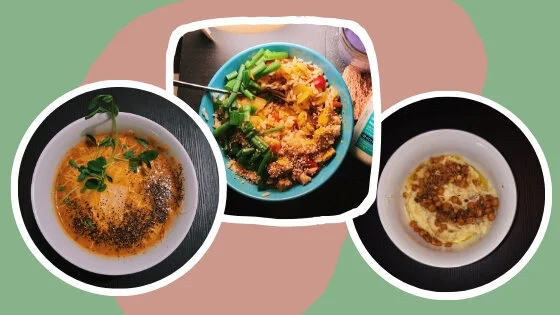Hi folks! Today I’d like to talk about mental health, which something I have spent more time thinking about this year than ever before in my life.
It may or may not be a surprise for you to learn this, but COVID-19 has negatively impacted many Canadians’ mental health. As a global community, we’re facing unprecedented challenges that will require all the brainpower, emotional labour, and sustainability we can muster to solve. We must have access to the mental healthcare that we need in order not only to survive, but also to thrive. I’d like to start on a micro level today by talking about something that’s helped me — taking advantage of my phone, rather than allowing it to work against me quite so much.
As someone who saw my Weekly Screen Time Report go up by much more than I’m proud of, a couple of months ago I decided to try and use my phone more positively. I figured there had to be lots of smart people working on lots of cool mental health-related apps, and after some research, I wasn’t disappointed! Here are my favourite mental health apps, coupled with brief rundowns on what they’re helpful for.
Headspace
Cost
- Normal subscription: $6/month or $70/year
- Student subscription: $10/year (I believe this may only work in the US! Apologies!)
- Family subscription: 6 accounts for $100/year (this is what I use with a group of friends!)
Source
This image gives an overview of what the app’s various features actually look like.
Headspace is one of the most popular meditation and sleep apps out there, and for good reason. I’ve been using it for about a year and a half and I don’t see myself stopping anytime soon. There is truly something for everyone, even if you’ve never tried meditation before!
You’ll find programs ranging anywhere from a minute to basically an infinite amount of time, and you can search/filter based on whatever you need. There are also courses, an exercise tab called “move”, and then my personal favourite — the sleep tab. Headspace offers guided sleep meditations, calming music, soundscapes, and something called “sleepcasts”, which is basically a 45-minute story with calming sounds behind it.
Moreover, if you’d like to get a better sense of what Headspace — or even meditation in general — entail, you should consider checking out Netflix’s Headspace Guide to Meditation! This 8-part series guides viewers through the many benefits of incorporating a meditation practice into their daily routines, whilst also providing them with opportunities to try it out themselves. This show is definitely on my watchlist.
Source
A screenshot of Jour’s Daily Journal screen.
Source
A sample screenshot of Jour’s Insights screen.
Cost
- Free version, with limited personalized features
- Paid version: $60/year, with a 7-day free trial
Jour is a mindfulness and mental health journal that uses tech to help you with your personal mental health needs. I have been using this app for about half a year, and I am such a huge fan of everything about it. It uses the freemium model — which essentially means there is both a free and a paid version, with the latter having more enhanced features than the former. While I recently upgraded to the paid subscription, I believe there is a lot of value in using whichever version you can afford.
Me, using Jour!
This beautifully-designed app has a whole host of features, including guided journals and breathing, ‘stories’ (ie. short blog-style posts on various topics), insights, and a record of all your entries. Personally, I believe the most powerful aspect of the app comes in the form of its AI-powered journal and its insights tab. First of all, the daily journal works by asking you a series of questions about your mood and what you believe it’s being affected by. Based upon your answers, it creates a custom open-ended questionnaire that you can fill out. After you complete it (these normally take 5-10 minutes, depending on how much detail you use), the paid version of the app provides you with a “breakthrough”: bite-sized advice based on what you wrote in your journal.
After you complete enough daily journals, the insights tab will begin to populate — providing you with information about the trends of your daily, weekly, and monthly moods and thoughts. If you can foresee how this would continue over time, coupled with the everlasting record of all your entries, you can imagine how powerful this might become in managing your mental health. I really can’t recommend this app enough.
Habit
Cost
- Free version, with limited features
- Premium version: $40/year
Let’s end off with a simple, but immensely powerful habit tracker that will propel you forward in meeting your goals! Habit is a colourful, easy-to-use habit tracker that I’ve had for about half a year. The reason I like this habit tracker more than any others is that the free version (which I personally use) allows you to make a good number of habits. I also like the simplicity of its interface; there’s one screen for everything, and it looks good.
There are a couple benefits of moving to the premium version — you can use dark mode, you can track unlimited habits, you can create more detailed smartphone notifications, and you can add a Habit-based widget to your homescreen. I’m personally happy with the free version for now given the simple reasons I use this app; however, I can totally see why you’d upgrade.
I started using a habit tracker not because I wanted to whip myself into shape, meet fitness goals, or do something crazy. Instead, I downloaded this app because I just wanted to take better care of myself. Earlier this year, I was really struggling with accomplishing what were, to me, the most basic things. Something I know about myself is that I gain happiness from a sense of accomplishment, regardless of the scale on which those accomplishments actually are. So, I set myself up with a digital checklist which would help me access that.
Some of the things I started keeping track of every day include: taking my vitamins, eating 3 meals (or an equivalent) per day, getting outside, meditating, journaling (both using the two apps above!), and drinking enough water. For me, just having a very straightforward place to go check those things off a list, and see a bar fill a little more, was enough to keep me motivated. This app has definitely positively contributed to my life, and I’m sure it will yours, too.
Conclusion
I simply want to end off by saying that of course these apps are no substitute to mental healthcare; however, they have certainly been of great assistance to me. I wholeheartedly believe in the missions and power of all of the apps I’ve recommended above — a level of such that can come only from using them daily over the course of months.
Are there any apps — or other online tools or resources — that I missed and should check out? Let me know in the comments! I look forward to hearing your feedback and commentary if you decide to try any of them.
With love and sustainability,
ethigirl :)












